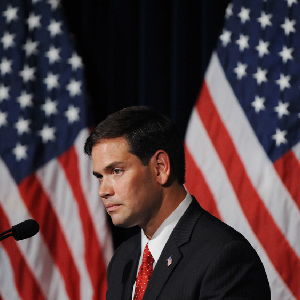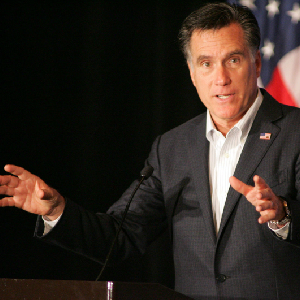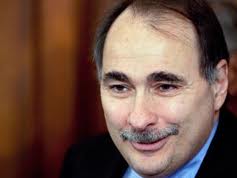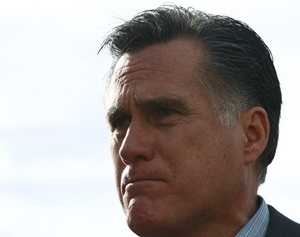Earlier this week, Cumulus Media sent out an email blast to fellow radio station owners with a photoshopped picture of former U.S. Presidential candidate Mike Huckabee, promoting him as the conservative talk radio host of the future. Though the email did not name Rush Limbaugh, the long-running, top-rated talk radio host whose program is nationally syndicated by Cumulus' rival, Clear Channel Communications, the intent was obvious to some recipients.
"They are going after Rush's affiliates," said one radio company executive who received Cumulus' email and spoke on condition of anonymity. "They are positioning Huckabee as the safe, non-dangerous alternative to Rush and saying to station owners, 'If you are looking for conservative content, we want you to consider our guy instead of theirs.'"
Huckabee presented Cumulus with its best chance ever to grow into a national competitor to Clear Channel in the radio syndication market even before Limbaugh on February 29 ignited his latest controversy by calling birth-control activist Sandra Fluke "a slut.
That the April 9 launch of "The Mike Huckabee Show" comes amid an exodus of advertisers from Limbaugh's program and an Internet-driven boycott is simply serendipity for Cumulus.
In an interview with Reuters on Friday, Cumulus co-Chief Operating Officer John Dickey described the Huckabee emails as "standard operating procedure" and said the company was "proud to offer up our content to the industry at large."
"Only one station in a city can offer Rush, so there are lots of other stations that are looking to put up an alternative to him regardless of whether he put his foot in his mouth," said Dickey. He was referring to how Limbaugh's contracts typically contain exclusivity clauses restricting him to one station in a market, instead of it being simulcast on multiple stations.
"We have been growing the affiliate base on that fact alone, but recent developments with Rush have put some wind in our sails and accelerated our efforts," Dickey said.
Cumulus owns the second-largest U.S. radio network, with 580 stations, behind Clear Channel, which owns about 900 stations. Cumulus ranks as the third-largest radio company by revenue, behind Clear Channel and CBS Radio.
Huckabee's show, which was born out of a dinner conversation between a representative for the former Arkansas governor and Dickey in the fall of 2010, will go head-to-head against Limbaugh from noon to 3 p.m. in all time U.S. time zones, Monday through Friday.
Limbaugh has dominated terrestrial talk radio ever since shock jock Howard Stern fled for the less regulated confines of satellite radio in 2006. The portly conservative pundit's program is broadcast on 600 radio stations across the country (20 more stations than Cumulus owns in total), and is heard by about 20 million listeners weekly.
As of last week, about 140 stations had signed on to carry Huckabee's show, and Dickey said that number is growing daily.
More important, only about 45 of those stations are owned and operated by Cumulus, meaning that the other stations that agreed to carry Huckabee's show have no affiliation with the company. Dickey said some of these stations plan to swap in Huckabee once their contracts with Limbaugh expire, though he declined to name which ones or where they were located.
Limbaugh's annual income, based in part on licensing fees for his show, is estimated by industry sources at $50 million.
Calls to Clear Channel for comment were referred to Premiere Networks, the company that syndicates Limbaugh's program.
"Rush Limbaugh continues to be the No. 1 talk radio host in America," a Premiere spokesperson said in a statement, noting that all his long-term sponsors remain with his show. "Mike Huckabee is the latest in a long line of those who have attempted to compete with Rush. We wish him the best with his new show."
A source familiar with Premiere's thinking put it more bluntly: "We have 900 stations. If Rush gets removed from a few, we have plenty of other places to put him."
TWO DEALS REALIZED
Cumulus' plan to take on Clear Channel in the syndication market were put in motion long before the impending Limbaugh-Huckabee battle. The roots can be traced to two deals: the $1.2 billion purchase of Susquehanna Radio in 2006 and $2.4 billion acquisition of Citadel Broadcasting in 2010.
Those deals transformed Cumulus from a sleepy small- to mid-market company into a national player. Before them, the largest market in which Cumulus had a presence was ranked 125th nationally. Now, the family-run company is in seven of the top 10 U.S. radio markets.
With a big national footprint and its own network, Cumulus is now able to develop and syndicate its own content as opposed to paying to license it from competitors such as Clear Channel.
Moreover, Cumulus can now shop its content to outside radio station owners, potentially stealing market share from Clear Channel. In essence, Cumulus has gone from being a purchaser of content to a creator of one.
"We eat our own cooking here. If something works for us, it should also work for others in the industry," said Dickey, referring to Cumulus' goal to license homegrown talent to others in the industry.
The company last month announced that it was replacing "Coast-to-Coast," a show produced by Clear Channel, with Cumulus' own "Red Eye Radio" on 22 of its stations. Earlier in March, Cumulus said it was dropping "The Billy Bush Show," produced by Dial Global, for an upcoming show of its own.
Cumulus licenses Limbaugh's show on about three dozen of its own stations. It is expected to replace Limbaugh with Huckabee once these contracts expire.
"I can guarantee you that the minute Cumulus' contract with Rush expires in New York, they will replace him with Huckabee," said Joel Hollander, the former CEO of CBS Radio now running private investment firm 264 Echo Place Partners.
For now Limbaugh has some breathing room - the vast majority of his contracts with Cumulus do not expire until next year. Dickey said Cumulus has "no plans to drop Rush" from any of its stations at this time and will "honor its contracts."
Dickey's diplomacy is smart radio politics. Cumulus must navigate a delicate divide between competing and cooperating with Clear Channel. The radio industry as a whole has been in secular decline for more than a decade, as Apple Inc's iPods, satellite radio Sirius XM Radio Inc and Internet streaming services such as Pandora Media Inc have eaten away at advertising sales and audience share.
Traditional radio companies have been forced to look for new avenues of growth, often in partnership with each other. Cumulus recently announced a deal to stream its stations on Clear Channel's iHeart-Radio digital platform. The two companies also joined forces on "SweetJack," radio's version of Groupon Inc's daily deals, set to launch nationwide on May 1.
"Cumulus does have a lot of holes across the country where it will need to work with Clear Channel and others radio companies, so what you are going to see is a lot of horse trading," said Hollander.
LACK OF RADIO STARS KEEPS RUSH ON AIR
Not unlike Howard Stern or Glenn Beck, Limbaugh is one of the few talk radio hosts who have a large and loyal enough fan base that he can leave the air waves altogether for satellite radio, the Internet, or something even more experimental.
But if Limbaugh does stick with traditional radio, he will likely remain a major voice for two main reasons: a shortage of stars and political talk radio has a rabid fan base.
Traditional radio's lack of stars is the reason Don Imus returned just eight months after being removed in 2007 for calling the Rutgers University women's basketball team a bunch of "nappy-headed hoes." And it is the reason why the source familiar with Premiere's thinking said the syndicator has no intention of removing Limbaugh from its air waves.
Indeed, some outside radio companies that syndicate Limbaugh's show are also sticking with him.
"We carry Limbaugh live in Bakersfield and we have no plans to change," said Joe Bilotta, CEO of independently owned Buckley Radio.
Moreover, Huckabee has to execute for Cumulus' grand plan to pay dividends. If he cannot attract an audience and prove that he can carry a show by himself, then all the talk about unseating Limbaugh will be just that - talk.
Interesting.






